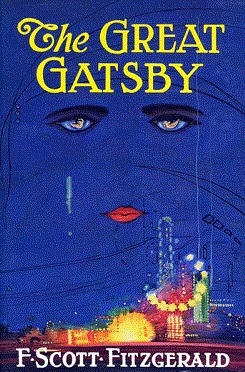
|
Masterand Teodor Vintilă The Great Gatsby (by F. Scott Fitzgerald) Rating: ★★★★★ (5/5) |
 |
|
F. Scott Fitzgerald was born on September 24, 1896, in the city of Saint Paul, Minnesota and was an American short story writer and novelist famous for his portrayals of the Jazz Age of the 1920s. "Fitzgerald was the only son of an unsuccessful, aristocratic father and an energetic, provincial mother. [...] he had typically ambivalent American feelings about American life, which seemed to him at once vulgar and dazzlingly promising." (Mizener, 2025, para. 1) This combination of aristocratic heritage, grand ambitions, and a unique sensitivity drove him to seek success in the academic and literary world, where he shaped both his personality and the relationships essential to his career. He also had an intensely romantic imagination, what he once called “a heightened sensitivity to the promises of life,” and he charged into experience determined to realize those promises. At both St. Paul Academy (1908–10) and Newman School (1911–13), he tried too hard and made himself unpopular, but at Princeton University he came close to realizing his dream of a brilliant success. He became a prominent figure in the literary life of the university and made lifelong friendships with Edmund Wilson and John Peale Bishop. He became a leading figure in the socially important Triangle Club, a dramatic society, and was elected to one of the leading clubs of the university. (Mizener, 2025, para. 2) Published in 1925, The Great Gatsby is considered one of the most important works of American literature. F. Scott Fitzgerald's novel captures both the charm and the decadence of the 1920s, a period of economic prosperity, but also moral superficiality. The story is narrated by Nick Carraway, a young man from the Midwest who arrives in New York and becomes a witness to a drama that unveils the illusions of the American Dream. Nick Carraway moves to West Egg, an area populated by the new aristocracy, where he meets Jay Gatsby, an enigmatic millionaire known for his extravagant parties. Gatsby is in love with Daisy Buchanan, a wealthy woman with whom he had a relationship in the past, before leaving for war. Now, Daisy is married to Tom Buchanan, a powerful and unfaithful man. Gatsby had built his entire life in the hope of winning Daisy back, but his dream is shattered when she chooses to stay with Tom. After a tense confrontation at the Plaza Hotel, Gatsby and Daisy leave together, and on their way home, Myrtle Wilson, Tom’s mistress, is fatally struck by Gatsby’s car, driven by Daisy. Tom convinces Myrtle’s husband, George Wilson, that Gatsby is responsible, and in a fit of rage, George kills Gatsby before taking his own life. Disgusted by the hypocrisy and lack of responsibility of the wealthy, Nick returns to the Midwest, realizing that the American Dream is nothing more than an illusion. The novel explores deep themes such as the illusion of the American Dream, moral corruption, and the impossibility of turning back time. Gatsby symbolizes a man who believes that material success can bring him ultimate happiness, but he meets a tragic end, trapped by an unattainable ideal. Fitzgerald portrays a society where wealth does not guarantee happiness, and privileged characters are often shallow and lacking in empathy. Nick Carraway, the novel’s narrator, plays the role of an impartial observer, but as the story progresses, he becomes disgusted by the moral corruption of the world he has entered. Unlike Gatsby, who lives on illusions, Nick is the one who understands the harsh reality of society. Fitzgerald’s narrative style is elegant and rich in symbolism. A notable example is the green light at the end of Daisy’s dock, a symbol of hope and an unattainable dream. Likewise, the "Valley of Ashes," where Myrtle lives, represents the chasm between the working class and the lavish world of the wealthy. One of the novel’s greatest strengths is its poetic writing and nostalgic atmosphere. Fitzgerald masterfully captures the spirit of the 1920s, with all its glamour and superficiality. Gatsby is a fascinating character, defined by his mystery and unwavering devotion to an ideal. However, some readers might find the characters difficult to sympathize with, especially Daisy and Tom, who are marked by selfishness and indifference. Additionally, the novel’s pacing may feel slow at times, and its abrupt, tragic ending can leave a sense of frustration. The Great Gatsby is a masterpiece of American literature, offering a profound critique of the American Dream and a society corrupted by money and power. It is a novel rich in symbolism, with an unmistakable lyrical style, captivating readers through a tragic story of love, illusions, and disillusionment. Although it may not be a novel for everyone, its cultural and literary impact remains undeniable. For those who appreciate introspective literature and deep social analysis, The Great Gatsby is an essential read, staying relevant even nearly a century after its publication. Values, emotions, intense desires, pride, and action – all paint a vivid picture of the world of 1920s, the Jazz Age. "[...] The Great Gatsby is the most profoundly American novel of its time; at its
conclusion, Fitzgerald connects Gatsby’s dream, his “Platonic conception of himself,” with the
dream of the discoverers of America." (Mizener, 2025, para. 6) References Fitzgerald, F. S. (1925). The Great Gatsby. Charles Scribner's Sons. Mizener, A. (2025, March 27). From St. Paul to Princeton. Encyclopaedia Britannica. |
|

